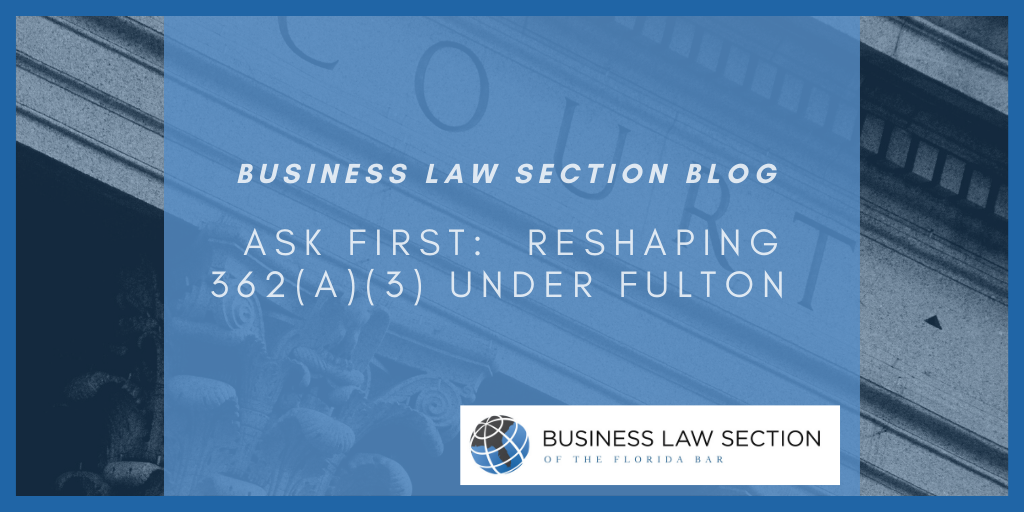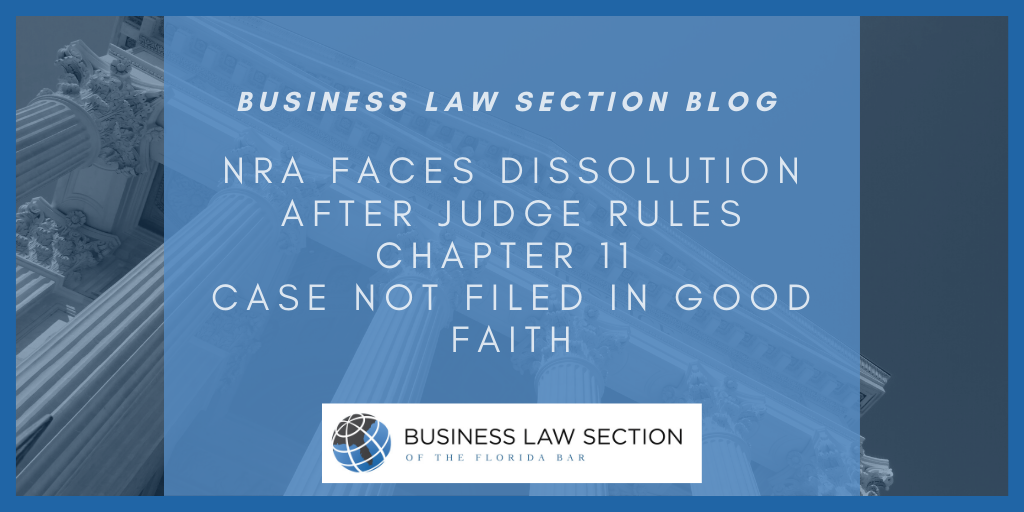Ask first: Reshaping 362(a)(3) under Fulton
By: Shirley Palumbo, Greenspoon Marder
I still recall many years ago, pre- In re Kalter [i] , when I went to the bankruptcy court in Miami for the first time. It was a rainy day; thunderstorms all over the place. I had a small umbrella that served no purpose as I crossed the street to enter the Claude Pepper Building and head upstairs to the courtroom. The court was packed; my suit and hair were soaking wet. The creditor’s attorney was waiting for me together with his witness, albeit this was a preliminary hearing on a motion for violation of the automatic stay.
My client, the debtor, had a van that had been repossessed pre-petition. Shortly after I had filed her bankruptcy petition, I demanded that the creditor return possession of the van, as I asserted was required under 11 U.S.C. 362(a)(3). The creditor refused to return possession. The issue was important for my debtor-client as the van had been specially equipped with an electronic step and other accessories for her disabled son. After argument, the judge sanctioned the creditor, and the van was returned to my client. I became a bankruptcy law devotee after this!
Fast forward in time to 2002, the 11th Circuit determined under In re Kalter that there is no violation of stay in like circumstances because, here in Florida, under the Certificate of Title statute there is a section that transfers title to the secured creditor upon a vehicle being repossessed. Consistent with Whiting Pools, Inc., [ii] with no ownership interest and merely a redemption interest, the vehicle is no longer part of the estate and a debtor no longer has the right to possession.
This case was followed by In re Rozier [iii] , which is seemingly contradictory to In re Kalter, supra, as it holds that the continued possession by a creditor of a vehicle repossessed pre-petition is a violation of the stay. Yet, it truly is consistent with Whiting Pools and In re Kalter and the premise that the asset must be property of the estate in order for a creditor to be in violation of the stay by retention of the asset. The decision was determined under Georgia law and under Georgia law, title does not pass to the secured creditor upon repossession.
Notably, in Florida, [iv] some bankruptcy judges have determined that creditors have an affirmative duty to turnover property of the estate after a bankruptcy filing. Thus, creditors who failed to exert reasonable effort to return property of the estate upon receipt of notice of a bankruptcy filing ran afoul of being sanctioned under 362(k) of the Code.
Recently, In City of Chicago v. Fulton [v], the Supreme Court took a creditor-friendly stance when it determined that passive retention is not a violation of the automatic stay under Section 362(a)(3) of the Bankruptcy Code. Even if it is property of the estate, the creditor has no need to be proactive and return estate property in its possession upon a bankruptcy case being filed. Instead, the duty is on the debtor or a trustee to file a motion for turnover or adversary proceeding under sec. 542 of the Code. Legally, it does not change the fact that the creditor must return the asset to the estate. Procedurally, however, there will be no sanctions against the creditor unless and until the motion for turnover is granted and the creditor fails to abide by orders of the court. Thus, placing the duty on the trustee or debtor to file the motion for turnover is certainly a benefit to the creditor, not to the estate.
This becomes an issue where creditors, especially those unfamiliar with the inherent policy of a fresh start and the protections afforded to debtors under the Code, refuse to give back assets that have been levied or seized prior to the debtor’s filing of a bankruptcy petition, be it towed and stored vehicles, bank funds, or otherwise; as retention may completely usurp any chances of plan confirmation and successful reorganization.
After Fulton, a debtor seeking to recover property that is in the possession of a creditor should immediately offer adequate protection to the secured creditor and file a motion for turnover under section 542(a) on an expedited basis in order to reduce delays, cost and expense. Section 362(a)(3) has been relegated to a dormant section, which has teeth only when a creditor affirmatively exerts control over an estate asset post-petition or refuses to surrender estate property after a motion for turnover has been granted.
[i] Bell–Tel Fed. Credit Union v. Kalter, 292 F.3d 1350, 1353 (11th Cir.2002).
[ii] See, U.S. v. Whiting Pools, Inc., 462 U.S. 198 (1983). The rule of Whiting Pools is that, if the debtor has an ownership under applicable non-bankruptcy law and a creditor has seized the property at the time of filing, the property reverts back as property of the estate.
[iii] Motors Acceptance Corp. v. Rozier (In re Rozier), 376 F.3d 1323 (11th Cir.2004).
[iv] See, for example, In re Stefan Kaschkadayev, 27 CBN 358, 2017 WL 587982 (Bankr. M.D. Fla. February 14, 2017). (The court granted relief from stay to a storage company, but only allowed pre-petition fees, where the debtor had surrendered the vehicle and creditor demanded post-petition fees for storage. The court determined the creditor’s continued possession of the stored vehicle after the bankruptcy was filed constituted exercising control and, therefore, a clear violation of the automatic stay.
[v] City of Chicago, Illinois v. Fulton, No. 19-357, 2021 WL 125106 (U.S. Jan. 14, 2021).



